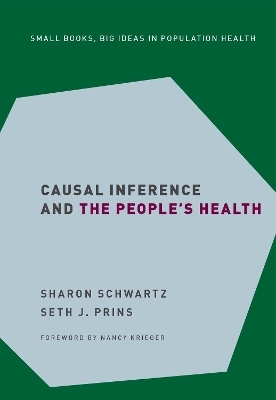
Causal Inference and the People's Health
Oxford University Press Inc (Verlag)
978-0-19-752858-7 (ISBN)
- Noch nicht erschienen (ca. Januar 2025)
- Versandkostenfrei innerhalb Deutschlands
- Auch auf Rechnung
- Verfügbarkeit in der Filiale vor Ort prüfen
- Artikel merken
A key goal of epidemiologic research is to uncover the causes of diseases and other health-related outcomes. But exactly what we mean by a "cause" and what types of phenomena qualify as causes, differ across historical periods, and is a contentious topic. The causal status of social phenomena has been, and continues to be, particularly precarious.
In Causal Inference and the People's Health, Sharon Schwartz and Seth J. Prins offer both a synthesis of the dominant school of thought around causality and propose an approach that keeps causal concepts as an organizing principle without marginalizing social phenomena. The authors examine the implications of the "Causal Revolution,"--introduced in epidemiology as the Potential Outcomes framework--which initiated a paradigm shift across the social sciences. As the authors show, this shift influences the questions we ask, the methods we use, the narratives we construct about our study results, and thus the knowledge we use to fight for the people's health. The guiding principle of the Causal Revolution is simple but profound: researchers should specify if their goal is description, prediction, or causation. In other words, researchers should declare their causal goals even for observational studies. This principle not only produced important innovations, but it also reignited debates about the definition of causation, the causal status of important social constructs like class and gender, and the role of manipulation or intervention in causal inference.
Interrogating these debates and embracing causal questions that identify and explain etiologic processes, Causal Inference and the People's Health offers a path forward that expands causal inference to include social forces as causes of the people's health, and therefore reinvigorates epidemiology's historical role in targeting systems and structures for change.
Sharon Schwartz is a Professor of Epidemiology at Columbia University's Mailman School of Public Health. She is the training coordinator for the Psychiatric Epidemiology Training Program. Her main research interests are in the relationship between social statuses and psychiatric disorders, and how causal frameworks shape research processes. Seth J. Prins is Assistant Professor of Epidemiology and Sociomedical Sciences at Columbia University. He is a social and psychiatric epidemiologist whose two programs of research concern the collateral public health consequences of mass criminalization and mass incarceration, and how the division and structure of labor influence mental illness and substance use. His research integrates advanced epidemiologic methods with contemporary social theory to operationalize criminalization, punishment, and social class as dynamic relational processes rather than individual attributes.
| Erscheint lt. Verlag | 8.1.2025 |
|---|---|
| Reihe/Serie | Small Books Big Ideas in Population Health |
| Zusatzinfo | 15 b&w line drawings; 11 tables |
| Verlagsort | New York |
| Sprache | englisch |
| Maße | 127 x 178 mm |
| Themenwelt | Studium ► Querschnittsbereiche ► Epidemiologie / Med. Biometrie |
| Studium ► Querschnittsbereiche ► Prävention / Gesundheitsförderung | |
| Sozialwissenschaften ► Soziologie | |
| ISBN-10 | 0-19-752858-9 / 0197528589 |
| ISBN-13 | 978-0-19-752858-7 / 9780197528587 |
| Zustand | Neuware |
| Informationen gemäß Produktsicherheitsverordnung (GPSR) | |
| Haben Sie eine Frage zum Produkt? |
aus dem Bereich


